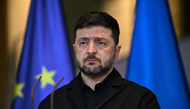American’s Ideas Helped Topple Arab Rulers
BOSTON - Halfway around the world from Tahrir Square in Cairo, an aging American intellectual shuffles about his cluttered brick row house in a working-class neighborhood in East Boston. His name is Gene Sharp. Stoop-shouldered and white-haired at 83, he grows orchids, has yet to master the Internet and hardly seems like a dangerous man.
But for the world’s despots, his ideas can be fatal.
Few in his own country have heard of Mr. Sharp. But for decades his practical writings on nonviolent revolution - most notably “From Dictatorship to Democracy,” a 93-page guide to toppling autocrats, available for download in 24 languages - have inspired dissidents around the world .
When Egypt’s April 6 Youth Movement was struggling to recover from a failed effort in 2005, they stumbled on Mr. Sharp while examining the Serbian movement Otpor, which he had influenced, said Ahmed Maher, a leading strategist.
When the nonpartisan International Center on Nonviolent Conflict slipped into Cairo several years ago to conduct a workshop, among the papers it distributed was Mr. Sharp’s “198 Methods of Nonviolent Action.”
Dalia Ziada, an Egyptian blogger who later organized similar sessions on her own, said trainees were active in both the Tunisia and Egypt revolts. She said that some activists translated excerpts of Mr. Sharp’s work into Arabic, and that his message of “attacking weaknesses of dictators” stuck with them.
Peter Ackerman, a onetime student of Mr. Sharp who founded the nonviolence center , cites his mentor as proof that “ideas have power.”
Mr. Sharp, hard-nosed yet exceedingly shy, is careful not to take credit. He is more thinker than revolutionary, though as a young man he protested segregation in the American South and spent nine months in a federal prison as a conscientious objector during the Korean War. He has had no contact with the Egyptian protesters, he said, although he recently learned that the Muslim Brotherhood had “From Dictatorship to Democracy” posted on its Web site.
While seeing the revolution that ousted Hosni Mubarak as a sign of “encouragement,” Mr. Sharp said, “The people of Egypt did that - not me.”
He has been watching events in Cairo unfold on CNN from his modest house in East Boston, which doubles as the headquarters of the Albert Einstein Institution, an organization Mr. Sharp founded in 1983 while running seminars at Harvard University and teaching political science at the University of Massachusetts at Dartmouth. In this era of Twitter revolutionaries, the Internet holds little allure for Mr. Sharp. He is not on Facebook and does not venture onto the Einstein Web site.
Based on studies of revolutionaries like Gandhi, nonviolent uprisings, civil rights struggles, economic boycotts and the like, Mr. Sharp has concluded that advancing freedom takes strategy and planning . Peaceful protest is best, he says, because it provokes autocrats to crack down. “If you fight with violence,”
Mr. Sharp said, “you are fighting with your enemy’s best weapon .” Mr. Sharp has seen action. In 1989, he witnessed the uprising in Tiananmen Square. In the early 1990s, he sneaked into a rebel camp in Myanmar at the invitation of Robert L. Helvey, a retired Army colonel who advised the opposition .
They met when Colonel Helvey was at Harvard; the military man thought the professor had ideas that could avoid war. “Here we were in this jungle, reading Gene Sharp’s work by candlelight,” Colonel Helvey recalled. “This guy has tremendous insight into society and the dynamics of social power.”
But As’ad AbuKhalil, a Lebanese political scientist and founder of the Angry Arab News Service blog, complained that Western journalists were looking for a “Lawrence of Arabia” to explain Egyptians’ success, in a colonialist attempt to deny credit to Egyptians.
Mr. Sharp says his work is far from done. He has just submitted a manuscript for a new book, “Sharp’s Dictionary of Power and Struggle: Terminology of Civil Resistance in Conflicts,” to be published this autumn . He wants readers to know he did not pick the title. “It’s a little immodest,” he said.
He also has a manuscript in the works about Einstein, who was also concerned about totalitarianism .
In the meantime, Mr. Sharp is keeping a close eye on the Middle East. He was struck by the Egyptian protesters’ discipline in remaining peaceful, and especially by their lack of fear. “That is straight out of Gandhi,” Mr. Sharp said. “If people are not afraid of the dictatorship, that dictatorship is in big trouble.”
By SHERYL GAY STOLBERG
스마터리빙
more [ 건강]
[ 건강]이제 혈관 건강도 챙기자!
[현대해운]우리 눈에 보이지 않기 때문에 혈관 건강을 챙기는 것은 결코 쉽지 않은데요. 여러분은 혈관 건강을 유지하기 위해 어떤 노력을 하시나요?
 [ 건강]
[ 건강]내 몸이 건강해지는 과일궁합
 [ 라이프]
[ 라이프]벌레야 물럿거라! 천연 해충제 만들기
 [ 건강]
[ 건강]혈압 낮추는데 좋은 식품
[현대해운]혈관 건강은 주로 노화가 진행되면서 지켜야 할 문제라고 인식되어 왔습니다. 최근 생활 패턴과 식생활의 변화로 혈관의 노화 진행이 빨라지고
사람·사람들
more
[송년행사 화보] “한 해를 마무리하며… 화기애애한 송년의 순간들”
LA 러너스클럽LA 러너스클럽(회장 김두병)은 13일 작가의 집에서 80여명의 회원과 가족이 참석한 가운데 송년회를 마쳤다. 2007년 창립된…

[송년행사 화보] “웃음과 감사 가득 ‘훈훈’… 함께해서 행복”
한국학교총연합회미주한국학교총연합회(회장 이영숙)가 주최한 제43회 장기 근속교사 포상 및 송년의 밤 행사가 140여명의 교사들이 참석한 가운데…
[송년행사 화보] “친구야 반갑다… 선배님들 모두…
경남중고경남중·고등학교 남가주 동창회(회장 예해덕)는 지난 6일 송년회를 열고 동문 및 가족 60여 명이 참석한 가운데 끈끈한 우정을 확인했다…
송년행사 게시판
월남전 참전자회월남전 참전자회 캘리포니아지회(회장 김종식)가 오는 17일(수) 오전 11시 LA 한인타운 해피음악원(2426 W. 8th St…
[송년행사 화보] “올 한 해 보람 가득… 내년에…
서강대남가주 서강대 동문회(회장 이정은·이사장 이찬근)의 2025년 정기총회 및 송년의 밤 행사가 지난 6일 웨스트리지 골프클럽에서 열렸다. …
많이 본 기사
- 신년 전야 남가주 폭탄 테러 모의… 4명 체포
- 캘리포니아 플라스틱백 퇴출 앞두고… 대형 체인, 종이봉투로 속속 전환
- 노로바이러스 변종 확산 어린이·고령자 감염 주의
- 출퇴근길에 갇힌 한인들… ‘시간·건강·돈’ 삼중고
- 연말연시 여행객 사상 최대 전망
- 시드니 총격 테러 IS 연관 수사확대
- 황반변성=노인병? 아니었다… 2030 시력 위협하는 뜻밖의 원인
- 모기지 금리, 내년에도 인하 ‘찔끔’ 전망
- 이재성, 김민재 앞에서 환상 헤딩골… 마인츠, 뮌헨과 2-2
- [지평선] 대통령의 ‘디테일’ 욕심
- 옥태훈·배용준·노승열, PGA 도전 고배
- [화요칼럼] 크리스마스 트리의 추억
- 비트코인 ‘약세장’ 8만6,000달러 붕괴
- 로봇청소기 ‘아이로봇’ 파산보호 신청
- ‘그랜트+샤프 70점’ 포틀랜드, ‘커리 48점’ GSW 격파
- 에어프레미아, 연말 할인 프로모션
- 뉴욕증시 하락 마감 AI 회피 심리 지속
- ‘해리가 샐리를 만났을 때’ 감독 부부 피살
- 치아 교정 똑같이 받아도… 50대 아빠가 엄마보다 만족, 왜
- [카후나 체어 USA] “온 가족을 위한 X-마스 대세일… 기쁨·만족 두 배”
- 삼성 갤 Z트라이폴드 ‘선발대’… 5분만에 완판
- 커뮤니티 재단과 한인사회의 미래
- 연말, 사기범들의 최대 성수기
- 은퇴 이후를 지탱하는 소득 구조의 과제
- 취임 1년 앞두고 기세 꺾인 트럼프
- 고려아연, 테네시에 제련소 건설
- 한화, 호주 방산 ‘오스탈’ 최대 주주 됐다
- 한인 팔레스타인 활동가 체포
- 올해 직장인의 단어로 ‘피로’ 선정
- SEC, 트럼프 취임 후 암호화폐 소송 중단
- [존청 변호사의 “경제·법률 핫이슈”] 세금으로 사라질 돈… ‘가족 재단’으로 유산 만든다
- [올림픽 골프] 연말 선물로 인기있는 골프 용품 세일
- AI 신 동맹 ‘팍스 실리카’ 공식출범
- 오픈AI, 새 GPT-5.2 시리즈 출시
- ‘벌레 먹은 나뭇잎’
- ‘만취 실신’ 라쿤 알고보니 ‘상습범’
- 뉴스타부동산그룹, 창립 37주년 송년모임·시상식 성료
- 12월 주택시장지수 개선… 예상치 상회
- LAPD 증원… 시장과 시의회 정면충돌
- “법 통과에도… 모기지 구제는 ‘그림의 떡’
- [우미노시즈쿠] 믿을 수 있는 면역 건강… 최고 후코이단
- 햄닛과 햄릿, 그 죽음에 대한 명상
- [송년행사 화보] “한 해를 마무리하며… 화기애애한 송년의 순간들”
- 칠레도 휩쓴 우파 물결… ‘트럼프 닮은꼴’ 카스트 당선
- 임신부, 코로나19 백신 접종해야
- ‘주님 보시기에 부끄럽지 않은 삶이길’… 11학년 강지은 특별상
- 홍콩 ‘반중 언론인’ 지미 라이… 보안법 유죄판결
- [새로 오픈했어요] “이제 타운서도 필라테스 쉽게 배워”
- 중일 갈등… 일본 54년 만에 ‘판다 제로’
- 상업용 대출의 여러 변수
1/5지식톡

-
 ☝️해외에서도 가능한 한국어 선생님…
0
☝️해외에서도 가능한 한국어 선생님…
0이 영상 하나면 충분합니다!♥️상담신청문의♥️☝️ 문의 폭주로 '선착순 상담'만 진행합니다.☎️ : 02-6213-9094✨카카오톡ID : @GOODEDU77 (@골뱅이 꼭 붙여주셔야합니다…
-
 테슬라 자동차 시트커버 장착
0
테슬라 자동차 시트커버 장착
0테슬라 시트커버, 사놓고 아직 못 씌우셨죠?장착이 생각보다 쉽지 않습니다.20년 경력 전문가에게 맡기세요 — 깔끔하고 딱 맞게 장착해드립니다!장착비용:앞좌석: $40뒷좌석: $60앞·뒷좌석 …
-
 식당용 부탄가스
0
식당용 부탄가스
0식당용 부탄가스 홀세일 합니다 로스앤젤레스 다운타운 픽업 가능 안녕 하세요?강아지 & 고양이 모든 애완동물 / 반려동물 식품 & 모든 애완동물/반려동물 관련 제품들 전문적으로 홀세일/취급하는 회사 입니다 100% …
-
 ACSL 국제 컴퓨터 과학 대회, …
0
ACSL 국제 컴퓨터 과학 대회, …
0웹사이트 : www.eduspot.co.kr 카카오톡 상담하기 : https://pf.kakao.com/_BEQWxb블로그 : https://blog.naver.com/eduspotmain안녕하세요, 에듀스팟입니다…
-
 바디프렌드 안마의자 창고 리퍼브 세…
0
바디프렌드 안마의자 창고 리퍼브 세…
0거의 새제품급 리퍼브 안마의자 대방출 한다고 합니다!8월 23일(토)…24일(일) 단 이틀!특가 판매가Famille: $500 ~ $1,000Falcon: $1,500 ~ $2,500픽업 & 배송직접 픽업 가능LA…
케이타운 1번가
오피니언
 노세희 부국장대우·사회부장
노세희 부국장대우·사회부장 커뮤니티 재단과 한인사회의 미래
 민경훈 논설위원
민경훈 논설위원햄닛과 햄릿, 그 죽음에 대한 명상
 한형석 사회부 부장대우
한형석 사회부 부장대우 연말, 사기범들의 최대 성수기
 정유환 수필가
정유환 수필가 [화요칼럼] 크리스마스 트리의 추억
 이영창 / 한국일보
이영창 / 한국일보 [지평선] 대통령의 ‘디테일’ 욕심
 이생진
이생진 ‘벌레 먹은 나뭇잎’
 옥세철 논설위원
옥세철 논설위원오늘의 베네수엘라가 내일의 동아시아국가…

퇴조의 핑크 타이드
 조지 F·윌 워싱턴포스트 칼럼니스트
조지 F·윌 워싱턴포스트 칼럼니스트 [조지 F. 윌 칼럼] 대통령의 전쟁수행권
1/3지사별 뉴스

피로 얼룩진 주말…지구촌 곳곳 총격사건 잇달아
지난 주말 동안 미동부 아이비리그 브라운대학에서 총격 사건이 발생, 최소 2명이 사망하고 9명이 부상한데 이어 호주 시드니에서는 사망자 16…
뉴욕·뉴저지 등 19개 주정부 H-1B비자‘10만달러 수수료’소송

워싱턴 한국학교협의회, 제37회 교사의 밤
재미한국학교 워싱턴지역협의회(회장 정광미)가 13일 ‘제 37회 교사의 밤’을 개최, 한 해 동안 헌신한 교사들의 노고를 위로했다. 올해 최우…
안수화 회장 연임 확정

트럼프, 합성마약 펜타닐을 ‘대량살상무기’로 지정
도널드 트럼프 대통령은 15일 신종 합성마약으로 미국에 대량 유입된 펜타닐을 ‘대량살상무기’(WMD)로 지정했다.트럼프 대통령은 이날 백악관에…
‘우미노시즈쿠 후코이단’ 감사 이벤트

오늘 하루 이 창 열지 않음 닫기 



















































.png)


댓글 안에 당신의 성숙함도 담아 주세요.
'오늘의 한마디'는 기사에 대하여 자신의 생각을 말하고 남의 생각을 들으며 서로 다양한 의견을 나누는 공간입니다. 그러나 간혹 불건전한 내용을 올리시는 분들이 계셔서 건전한 인터넷문화 정착을 위해 아래와 같은 운영원칙을 적용합니다.
자체 모니터링을 통해 아래에 해당하는 내용이 포함된 댓글이 발견되면 예고없이 삭제 조치를 하겠습니다.
불건전한 댓글을 올리거나, 이름에 비속어 및 상대방의 불쾌감을 주는 단어를 사용, 유명인 또는 특정 일반인을 사칭하는 경우 이용에 대한 차단 제재를 받을 수 있습니다. 차단될 경우, 일주일간 댓글을 달수 없게 됩니다.
명예훼손, 개인정보 유출, 욕설 등 법률에 위반되는 댓글은 관계 법령에 의거 민형사상 처벌을 받을 수 있으니 이용에 주의를 부탁드립니다.
Close
x